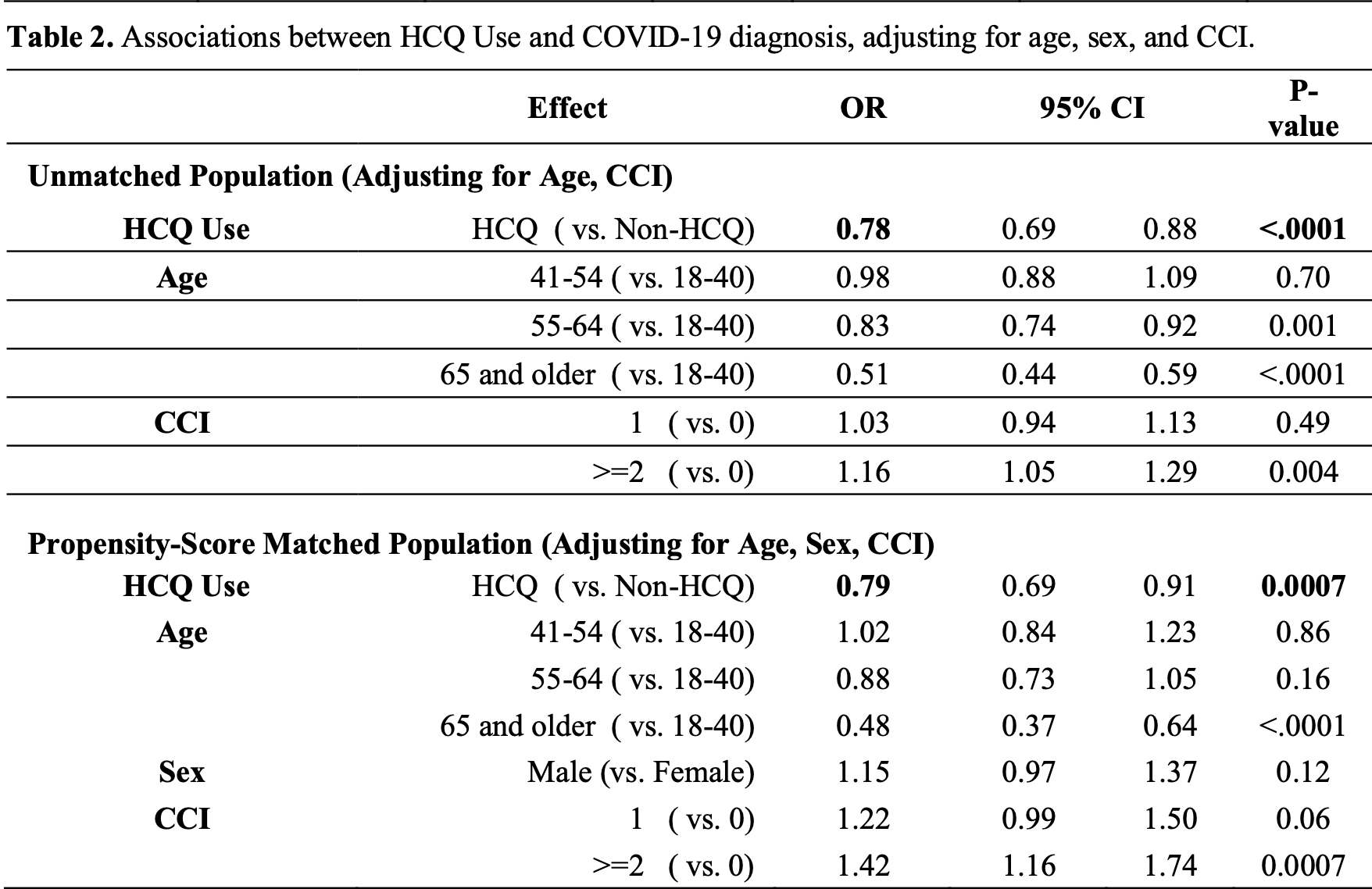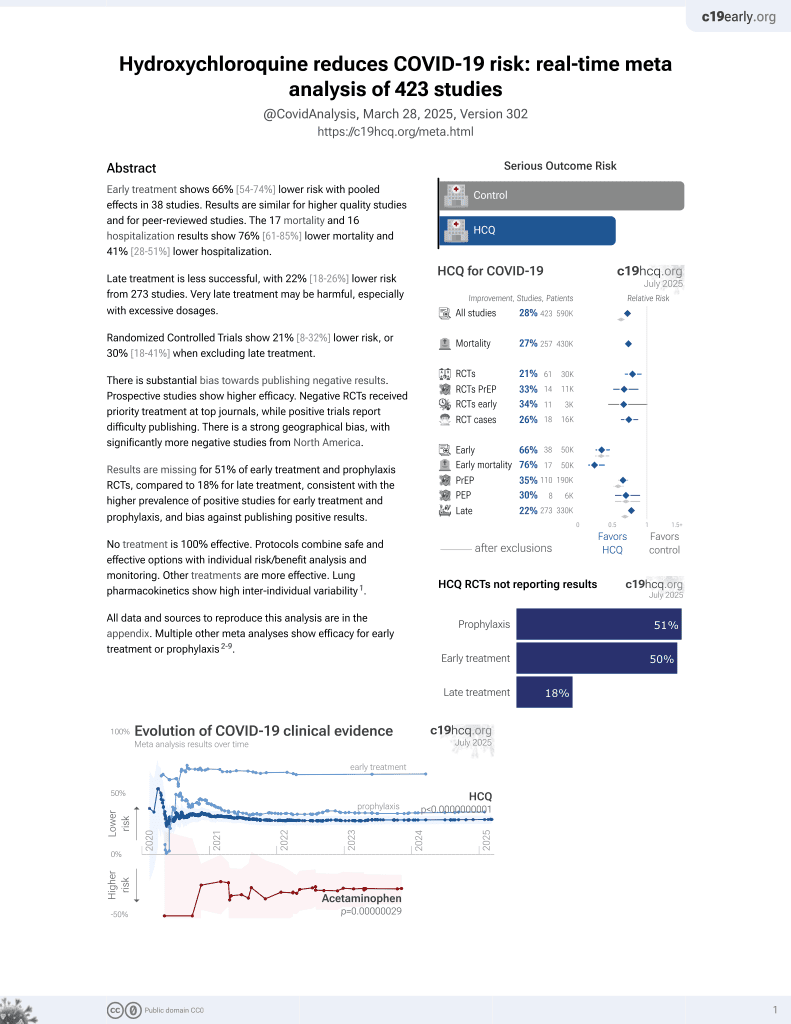
The Efficacy of Long-Term Hydroxychloroquine Use in the Prevention of COVID-19: A Retrospective Cohort Study
et al., Studies in Health Technology and Informatics, doi:10.3233/SHTI230489, Jun 2023
HCQ for COVID-19
1st treatment shown to reduce risk in
March 2020, now with p < 0.00000000001 from 424 studies, used in 59 countries.
No treatment is 100% effective. Protocols
combine treatments.
6,400+ studies for
210+ treatments. c19early.org
|
PSM retrospective SLE/RA patients in the USA, showing lower COVID-19 cases with HCQ prophylaxis.
Standard of Care (SOC) for COVID-19 in the study country,
the USA, is very poor with very low average efficacy for approved treatments1.
Only expensive, high-profit treatments were approved for early treatment. Low-cost treatments were excluded, reducing the probability of early treatment due to access and cost barriers, and eliminating complementary and synergistic benefits seen with many low-cost treatments.
|
risk of case, 21.0% lower, OR 0.79, p < 0.001, treatment 13,932, control 27,864, adjusted per study, propensity score matching, multivariable, RR approximated with OR.
|
| Effect extraction follows pre-specified rules prioritizing more serious outcomes. Submit updates |
Finkelstein et al., 29 Jun 2023, retrospective, USA, peer-reviewed, 2 authors, study period January 2020 - September 2020.
The Efficacy of Long-Term Hydroxychloroquine Use in the Prevention of COVID-19: A Retrospective Cohort Study
doi:10.3233/SHTI230489
The use of hydroxychloroquine (HCQ) in the prevention or treatment of COVID-19 remains controversial due to the insufficient supporting evidence and clinical studies indicating that it does not reduce COVID-19 mortality. Its potential protective effects against SARS-CoV-2 are still unclear. Big data resources, such as MarketScan database containing over 30 million insured participants annually, have not been used systematically to assess the association between long-term HCQ use and the risk of COVID-19. This retrospective study aimed to determine the protective effect of HCQ using the MarketScan database. We examined COVID-19 incidence from January to September 2020 among adult patients with systemic lupus erythematosus or rheumatoid arthritis who had received HCQ for at least 10 months in 2019 compared to those who did not. Propensity score matching was used to control for confounding variables and make the HCQ and non-HCQ groups comparable in this study. After matching at the ratio of 1:2, the analytical dataset comprised 13,932 patients who received HCQ for over 10 months and 27,754 HCQnaïve patients. Multivariate logistic regression showed that long-term HCQ use was associated with a lower likelihood of COVID-19 in patients who had been receiving HCQ for over 10 months (OR=0.78, 95% CI: 0.69-0.88). These findings suggest that long-term HCQ use may provide protection against COVID-19.
References
Arshad, Kilgore, Chaudhry, Treatment with hydroxychloroquine, azithromycin, and combination in patients hospitalized with COVID-19, International journal of infectious diseases
Boulware, Pullen, Bangdiwala, A Randomized Trial of Hydroxychloroquine as Postexposure Prophylaxis for Covid-19, doi:10.1056/NEJMoa2016638
Gautret, Lagier, Parola, Hydroxychloroquine and azithromycin as a treatment of COVID-19: results of an open-label non-randomized clinical trial, International journal of antimicrobial agents
Geleris, Sun, Platt, Observational study of hydroxychloroquine in hospitalized patients with Covid-19
Group, Effect of hydroxychloroquine in hospitalized patients with Covid-19
Maisonnasse, Guedj, Contreras, Hydroxychloroquine use against SARS-CoV-2 infection in non-human primates, Nature
Meo, Klonoff, Akram, Efficacy of chloroquine and hydroxychloroquine in the treatment of COVID-19, Eur Rev Med Pharmacol Sci
Principi, Esposito, Chloroquine or hydroxychloroquine for prophylaxis of COVID-19, Lancet Infect Dis
Rainsford, Parke, Clifford-Rashotte, Kean, Therapy and pharmacological properties of hydroxychloroquine and chloroquine in treatment of systemic lupus erythematosus, rheumatoid arthritis and related diseases, Inflammopharmacology, doi:10.1007/s10787-015-0239-y.Epub
Skipper, Pastick, Engen, Hydroxychloroquine in nonhospitalized adults with early COVID-19: a randomized trial, Annals of internal medicine
Sundararajan, Henderson, Perry, Muggivan, Quan et al., New ICD-10 version of the Charlson comorbidity index predicted in-hospital mortality, Journal of clinical epidemiology
DOI record:
{
"DOI": "10.3233/shti230489",
"ISBN": [
"9781643684000",
"9781643684017"
],
"ISSN": [
"0926-9630",
"1879-8365"
],
"URL": "http://dx.doi.org/10.3233/SHTI230489",
"abstract": "<jats:p>The use of hydroxychloroquine (HCQ) in the prevention or treatment of COVID-19 remains controversial due to the insufficient supporting evidence and clinical studies indicating that it does not reduce COVID-19 mortality. Its potential protective effects against SARS-CoV-2 are still unclear. Big data resources, such as MarketScan database containing over 30 million insured participants annually, have not been used systematically to assess the association between long-term HCQ use and the risk of COVID-19. This retrospective study aimed to determine the protective effect of HCQ using the MarketScan database. We examined COVID-19 incidence from January to September 2020 among adult patients with systemic lupus erythematosus or rheumatoid arthritis who had received HCQ for at least 10 months in 2019 compared to those who did not. Propensity score matching was used to control for confounding variables and make the HCQ and non-HCQ groups comparable in this study. After matching at the ratio of 1:2, the analytical dataset comprised 13,932 patients who received HCQ for over 10 months and 27,754 HCQ-naïve patients. Multivariate logistic regression showed that long-term HCQ use was associated with a lower likelihood of COVID-19 in patients who had been receiving HCQ for over 10 months (OR=0.78, 95% CI: 0.69-0.88). These findings suggest that long-term HCQ use may provide protection against COVID-19.</jats:p>",
"author": [
{
"affiliation": [
{
"name": "University of Utah, Salt Lake City, UT, USA"
}
],
"family": "Finkelstein",
"given": "Joseph",
"sequence": "first"
},
{
"ORCID": "http://orcid.org/0000-0002-5135-0292",
"affiliation": [
{
"name": "University of Utah, Salt Lake City, UT, USA"
}
],
"authenticated-orcid": false,
"family": "Huo",
"given": "Xingyue",
"sequence": "additional"
}
],
"container-title": "Studies in Health Technology and Informatics",
"content-domain": {
"crossmark-restriction": false,
"domain": []
},
"created": {
"date-parts": [
[
2023,
6,
30
]
],
"date-time": "2023-06-30T07:52:58Z",
"timestamp": 1688111578000
},
"deposited": {
"date-parts": [
[
2023,
6,
30
]
],
"date-time": "2023-06-30T07:52:59Z",
"timestamp": 1688111579000
},
"indexed": {
"date-parts": [
[
2023,
7,
1
]
],
"date-time": "2023-07-01T04:34:26Z",
"timestamp": 1688186066796
},
"is-referenced-by-count": 0,
"isbn-type": [
{
"type": "print",
"value": "9781643684000"
},
{
"type": "electronic",
"value": "9781643684017"
}
],
"issued": {
"date-parts": [
[
2023,
6,
29
]
]
},
"license": [
{
"URL": "https://creativecommons.org/licenses/by-nc/4.0/",
"content-version": "unspecified",
"delay-in-days": 0,
"start": {
"date-parts": [
[
2023,
6,
29
]
],
"date-time": "2023-06-29T00:00:00Z",
"timestamp": 1687996800000
}
}
],
"link": [
{
"URL": "https://ebooks.iospress.nl/pdf/doi/10.3233/SHTI230489",
"content-type": "unspecified",
"content-version": "vor",
"intended-application": "similarity-checking"
}
],
"member": "7437",
"original-title": [],
"prefix": "10.3233",
"published": {
"date-parts": [
[
2023,
6,
29
]
]
},
"published-print": {
"date-parts": [
[
2023,
6,
29
]
]
},
"publisher": "IOS Press",
"reference-count": 0,
"references-count": 0,
"relation": {},
"resource": {
"primary": {
"URL": "https://ebooks.iospress.nl/doi/10.3233/SHTI230489"
}
},
"score": 1,
"short-title": [],
"source": "Crossref",
"subtitle": [],
"title": "The Efficacy of Long-Term Hydroxychloroquine Use in the Prevention of COVID-19: A Retrospective Cohort Study",
"type": "book-chapter"
}
